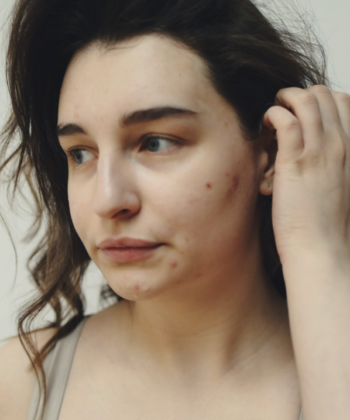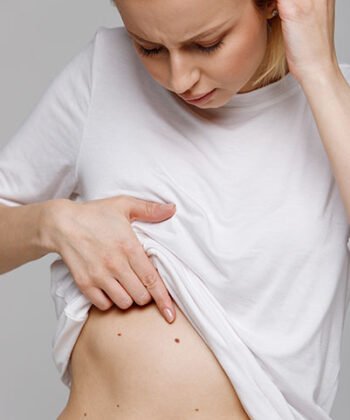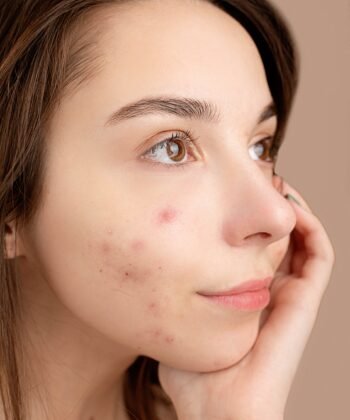The Impact of Diet on Acne: What You Eat Matters

Diet plays a critical factor in a person’s overall health and well-being. People with a healthy balanced diet tend to live longer and have a lower risk of developing serious health problems such as cardiovascular disease and type 2 diabetes.
But what can be said more specifically about the role of diet and acne?
Despite limitations in studies, recent research is providing stronger support for diet as a potential cause of acne and other skin conditions.
However, most dermatologists agree that more work on the subject is needed before solid conclusions can be drawn on the links between acne and diet.
There is some anecdotal evidence that diet could be related to acne breakouts.
The role of specific foods, such as dairy products, along with certain dietary patterns, may be a potential cause of acne and acne outbreaks.
When it comes to diet and acne, foods that quickly raise your blood sugar (also known as high glycaemic foods), as well as dairy, may play a role in the development of acne.
Foods that are rich in sugar, simple carbohydrates, and dairy may increase the amount of insulin-like growth factor 1 (IGF-1). Having an excess of this hormone in your blood can cause your oil glands to produce more sebum, which will lead to acne and inflammation.
Researchers 1 believe IGF-1 also causes an increase in the hormones dihydrotestosterone (DHT) and testosterone. These hormones bind to receptors in the skin and lead to your sebaceous glands expanding and producing more oil, which plays a role in the development of acne.
Foods that cause blood sugar to rise rapidly include sugar, pasta, white bread, and white rice.
These foods are known as known as “high-glycemic” carbohydrates.
Low-Glycemic foods
If high glycaemic foods trigger acne, then low glycaemic foods may reduce the risks of developing and worsening acne. These foods include complex carbohydrates, which are found in whole-grain breads and cereals, legumes (peas, beans, lentils), and fresh fruits and vegetables.
Is the Western diet to blame?
The so-called ‘Western diet’ is a modern diet that is characterised by high amounts of dairy, trans and saturated fats as well as glycaemic carbohydrates.
These kinds of foods have been found to not only stimulate the production of hormones that lead to excess sebum, but to inflammation, which can also contribute to acne.
Recent Studies 2 into the development of acne vulgaris have noted that acne rates are significantly lower in non-westernized societies.
A study on the remote Pacific island of Kitava found that there were NO cases of acne vulgaris among the 1200 residents observed over an 843-day period.
The Kitavans have a lifestyle and diet similar to that of our hunter-gatherer ancestors, consisting mainly of fruit, fish, and vegetables, and are uninfluenced by western processed foods.
This, along with their lower incidence of chronic diseases such as cardiovascular disease and chronic inflammatory disease, suggests that diet is one of the environmental factors contributing to the difference in acne rates between traditional non-westernized and modern westernized societies.
Other studies on primal and indigenous societies have also reported lower rates of acne.
The prevalence of acne in Western societies may well be linked to the Western diet, and further research is needed to confirm this association.
Vitamin A and E and Zinc
A study 3 was conducted to examine the relationship between the levels of vitamins A, E, and zinc in the plasma of acne patients and the severity of their acne.
The results indicated a correlation between higher levels of these substances in the plasma and less severe acne.
While the exact mechanisms of how these vitamins and zinc affect acne are not fully understood, they are essential elements for overall health and may play a role in the development of acne.
Foods that include vitamin A include: sweet potatoes, carrots, spinach, cantaloupe, and beef liver.
Foods that are high in vitamin E include: almonds, sunflower seeds, avocados & peanut butter.
Foods high in zinc include: oysters, beef pork, chicken, beans and nuts.
Omega-3 fatty acid and gamma-linolenic acid
Gamma-Linolenic Acid (GLA) and Omega-3 are both essential fatty acids that the body needs but cannot produce on its own. GLA is found in plant-based oils such as borage oil and blackcurrant seed oil.
Omega three is a polyunsaturated fatty acid that is found typically in oily cold-water fish such as salmon, sardines and anchovies. It has been shown to have anti-inflammatory effects on human skin, and it might play a physical structural role in protecting the skin barrier’s integrity.
A recent study 4 showed that after 10 weeks of supplementing with either omega-3 fatty acids or gamma-linolenic acid (GLA), there was a significant decrease in both inflammatory and non-inflammatory acne lesions.
Both GLA and Omega-3 fatty acid has anti-inflammatory and anti-cancer properties, but not enough peer-reviewed research has been conducted on the influence of these fatty acids on acne.
Can milk cause acne outbreaks?
The belief that milk causes acne is a commonly held notion. There have been many studies 5 dedicated to answering this question and clearing up the myths surrounding it. A study in the US demonstrated an association between dairy intake and acne in three different populations. The study concluded that there was a connection, but it was not a very strong one.
Some studies suggest 5 that skim milk has a stronger connection with acne than versus other types of diary. The cause is believed to be the hormones, including growth hormones and anabolic steroids, in milk, as well as the impact of dairy products’ carbohydrate content on insulin and insulin-like growth factor-1 (IGF-1). Having an excess of IGF-1 in the blood can lead to increased oil gland production and cause acne and inflammation.
To Conclude
Although dairy and high glycaemic foods may trigger acne breakouts and play a role in causing acne to begin with, more research is needed to definitively conclude what role diet, foods (or other) have.
For now, eating a balanced, healthy diet rich in fresh fruits and vegetables, lean protein, and whole grains seems to be the best diet recommendation for managing overall health.
Dietary changes may not have much impact on moderate to severe acne cases and other skin conditions in general, so it’s always best to speak to a consultant dermatologist if you have any skin concerns.
Incorrect dietary advice for acne sufferers can be harmful as it may delay seeking proper treatment from a professional dermatologist or GP. If you have questions about how your diet may be affecting your skin, our dermatologists are here to help.
References
1 – Meixiong J, Ricco C, Vasavda C, Ho BK. Diet and acne: A systematic review. JAAD Int. 2022 Mar 29;7:95-112. doi: 10.1016/j.jdin.2022.02.012. PMID: 35373155; PMCID: PMC8971946.
2 – Cordain L, Lindeberg S, Hurtado M, Hill K, Eaton SB, Brand-Miller J. Acne vulgaris: a disease of Western civilization. Arch Dermatol. 2002 Dec;138(12):1584-90. doi: 10.1001/archderm.138.12.1584. PMID: 12472346.
3 – Cervantes J, Eber AE, Perper M, Nascimento VM, Nouri K, Keri JE. The role of zinc in the treatment of acne: A review of the literature. Dermatol Ther. 2018 Jan;31(1). doi: 10.1111/dth.12576. Epub 2017 Nov 28. PMID: 29193602.
4 – Jung JY, Kwon HH, Hong JS, Yoon JY, Park MS, Jang MY, Suh DH. Effect of dietary supplementation with omega-3 fatty acid and gamma-linolenic acid on acne vulgaris: a randomised, double-blind, controlled trial. Acta Derm Venereol. 2014 Sep;94(5):521-5. doi: 10.2340/00015555-1802. PMID: 24553997.
5 – Katta R, Desai SP. Diet and dermatology: the role of dietary intervention in skin disease. J Clin Aesthet Dermatol. 2014 Jul;7(7):46-51. PMID: 25053983; PMCID: PMC4106357.
6 – Goh W, Kallianpur KJ, Chow D, Almeida PG, Brown AC, Pager S, Sil P. Chocolate and acne: how valid was the original study? Clin Dermatol. 2011 Jul-Aug;29(4):459-60. doi: 10.1016/j.clindermatol.2011.05.002. PMID: 21679875.
7 – Baldwin H, Tan J. Effects of Diet on Acne and Its Response to Treatment. Am J Clin Dermatol. 2021 Jan;22(1):55-65. doi: 10.1007/s40257-020-00542-y. Erratum in: Am J Clin Dermatol. 2020 Dec 26;: PMID: 32748305; PMCID: PMC7847434.

Medically reviewed by Dr. Daniel Glass
UK trained Consultant Dermatologist Dr Daniel Glass is a General Medical Council registered skin specialist, qualified in both adult and paediatric Dermatology.












